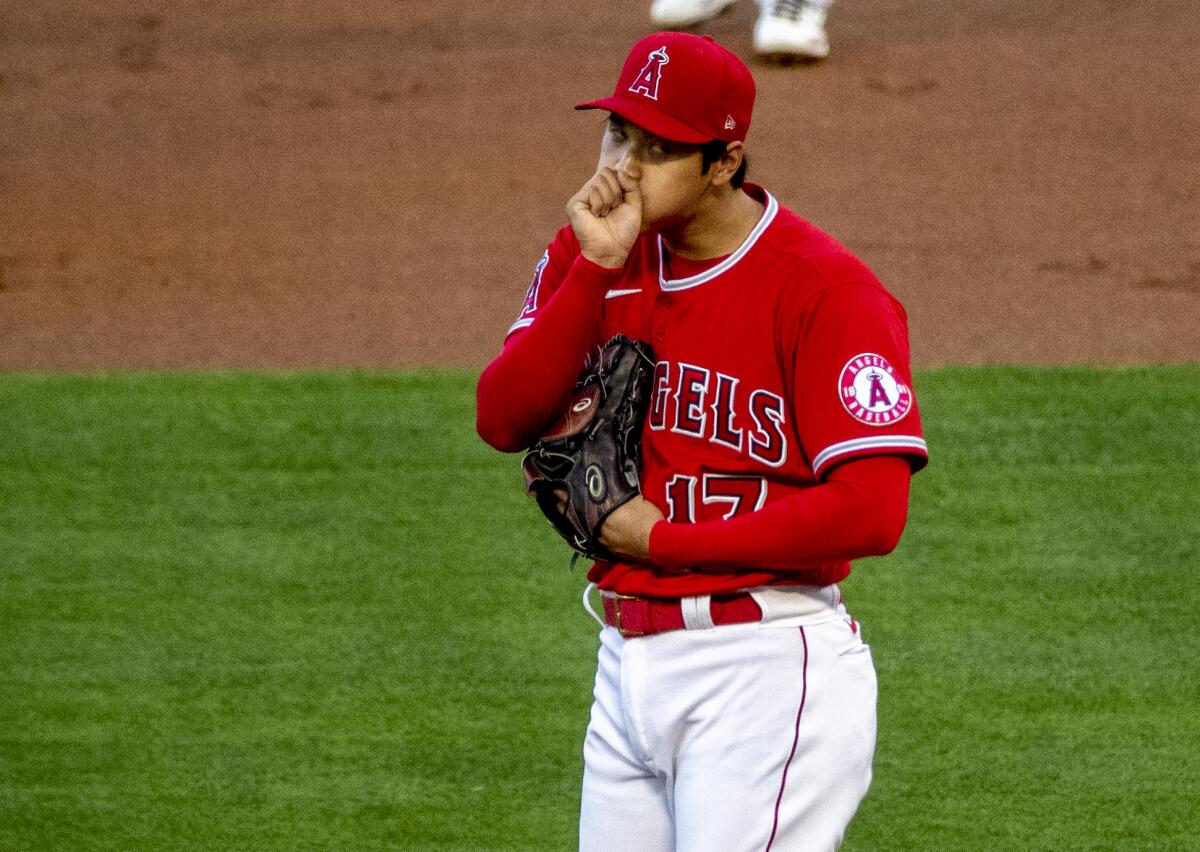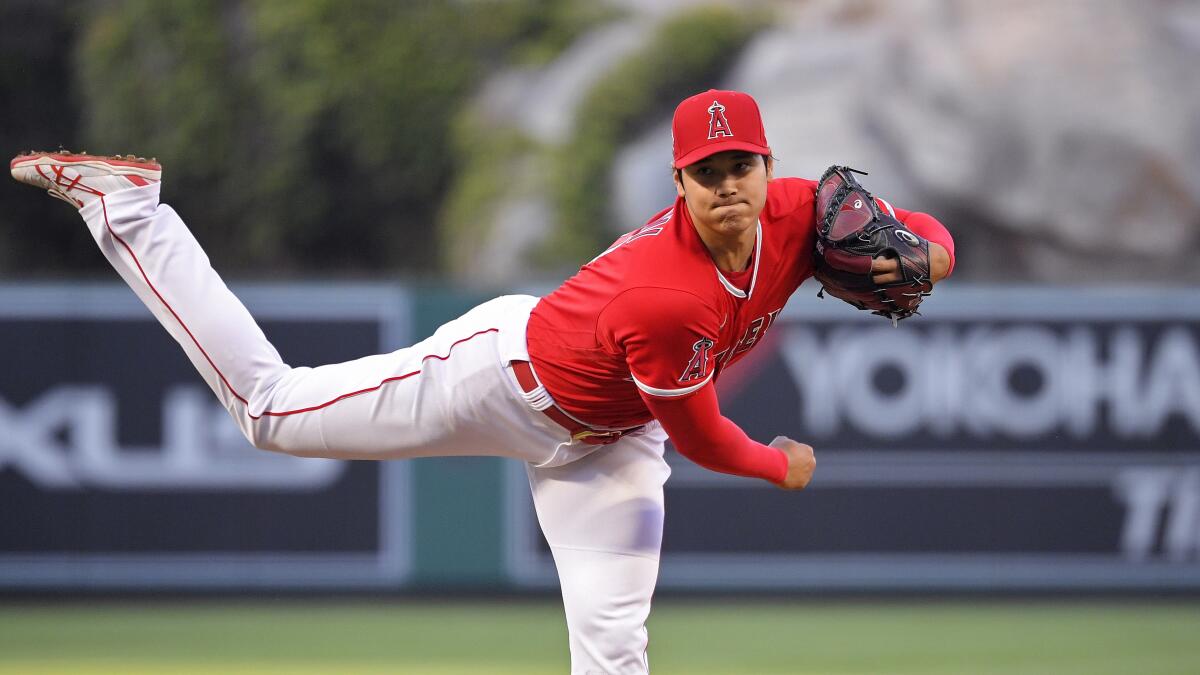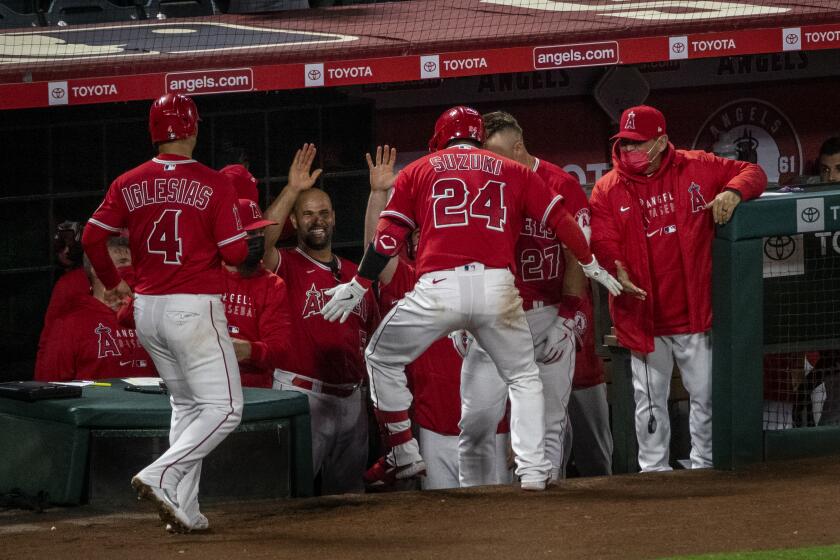Angels pitcher Shohei Ohtani has elite stuff. Now he just needs to work on his command

Max Scherzer and Stephen Strasburg.
Those were the names that Angels catcher Kurt Suzuki referenced Tuesday night, when the veteran backstop was asked to compare Shohei Ohtani to other pitchers he’s caught during his 15 MLB seasons.
“Honestly, it’s some of the best stuff I’ve caught,” Suzuki said. “I put his stuff up there with those guys. He is a special talent.”
There were moments Tuesday night, when Ohtani returned from a 16-day layoff caused by a blister to throw four scoreless innings against the Texas Rangers, that such dominance was clear.
He escaped a bases-loaded jam in the first inning, dialing up back-to-back strikeouts with his splitter to end a threat created by three early walks. He gave up his lone hit of the game in the second, but stranded it by fanning Isiah Kiner-Falefa in three pitches.
He completed the third in only 12 throws, including a strikeout of Joey Gallo. And he worked out of trouble again in the fourth, bouncing back from a walk and a hit-by-pitch with another strikeout of Kiner-Falefa to conclude his evening.
The Angels play the Texas Rangers in a three-game series starting Monday night at Angel Stadium. Follow along for complete coverage of the series.
“His command wasn’t as he would have liked, but when it was time to make pitches, he made pitches,” Suzuki said following the Angels’ 6-2 win, during which Ohtani had seven strikeouts but also six walks. “That was the whole theme for his outing: Making pitches when he needed to. That was huge for us.”
Indeed, now that Ohtani’s blister appears to be resolved — the right-hander said he came out of his outing feeling good and doesn’t expect the blister to limit him moving forward — it seems there’s only one big issue still holding him back on the mound; one important improvement that could help him make good on the potential almost everybody sees in his pitching.
“We have to get to the point where the command is tidied up a bit,” Angels manager Joe Maddon said. “And we will. I’ve seen this in the past with other guys. He’ll tidy it up and then you’re going to see him more deeply in the game.”
Maddon later continued: “You’re not normally going to beat this guy up. I don’t think you can hit multiple homers or a bunch of line drive base hits … I would bet the other [team] is going to want to try to wait him out to get him out, because they normally don’t square him up. So as he gains command — and he will — of all of his stuff, that’s when he will pitch deeply into games very successfully.”
The numbers back up that sentiment.
Of the 41 batters Ohtani has faced in his two starts this year, only three have recorded hits (all singles). Of the 15 balls opponents have put in play, only five have even left the infield. Ohtani is generating a whiff on more than 40% of his batters’ swings. And even when they do connect, few of Ohtani’s pitches have been hit with the barrel.

His fastball, which he threw slightly softer Tuesday because of his blister, is averaging upper-90s mph velocities. He said he’s putting more cut action on his splitter, which has accounted for 10 of his 14 strikeouts. And all of his pitches are recording increased spin rates over his last extended stretch pitching in early 2018, something Ohtani credited as a sign of his improved health after overcoming elbow, forearm and knee injuries in recent seasons.
“There’s not a whole lot of mechanical stuff with him because his delivery and everything he does is clean,” Angels interim pitching coach Matt Wise said before Tuesday’s game. “He throws pretty. I don’t know if that’s exactly scientific, but his body moves very efficiently. That leads to the upside. The upside is pretty high, obviously.”
The next big step in unlocking all that potential could rest in the consistency of Ohtani’s command.
Most of the trouble he has faced this season has been of his own doing. He has 11 walks in his 8 ⅔ innings thus far, putting him in stressful situations and a burden on his pitch counts.
On Tuesday, for example, he threw 28 pitches in his three-walk first inning, immediately burning through much of his planned 75-pitch limit. And while he settled down during the next three innings, he said most of his non-splitters “were all over the place.” Of his 80 total pitches, only 37 were strikes.
The Angels can point to several reasons for their hot start, beginning with Mike Trout’s dominance. What else has contributed?
“I give it a zero out of 100,” Ohtani said through his interpreter when asked to assess his control against the Rangers. “It’s definitely something I need to improve on for my next outing. Obviously the intensity is different from the bullpen to a game, so now I need to work on my command.”
Maddon thinks better control will come with time, hopeful it’s something Ohtani will gradually discover now that he will again pitch on a regular schedule in the team’s six-man rotation.
Suzuki partially attributed the lack of command to rust after Ohtani’s two-week break, pointing to the fact it didn’t lead to any runs as a testament to the 26-year-old’s overall pitching talent.
“He knows what he wants to do on the mound,” Suzuki said. “He can really spin the ball. He can throw any pitch at any time. That’s what makes him so special. He’s not just a thrower. He has an idea of what he wants to do out there.”
So, how much better could Ohtani become with improved command?
“I think the sky’s the limit,” Suzuki said. “If you match his stuff up, if he’s feeling pretty good that night with his command, there’s a chance to do something special every time he takes the ball on the mound. No-hitter. Perfect game. Shutout or whatnot. A lot of strikeouts. That’s the type of pitcher that he is. He works hard between starts. And I expect him to just get better and better.”
More to Read
Go beyond the scoreboard
Get the latest on L.A.'s teams in the daily Sports Report newsletter.
You may occasionally receive promotional content from the Los Angeles Times.









